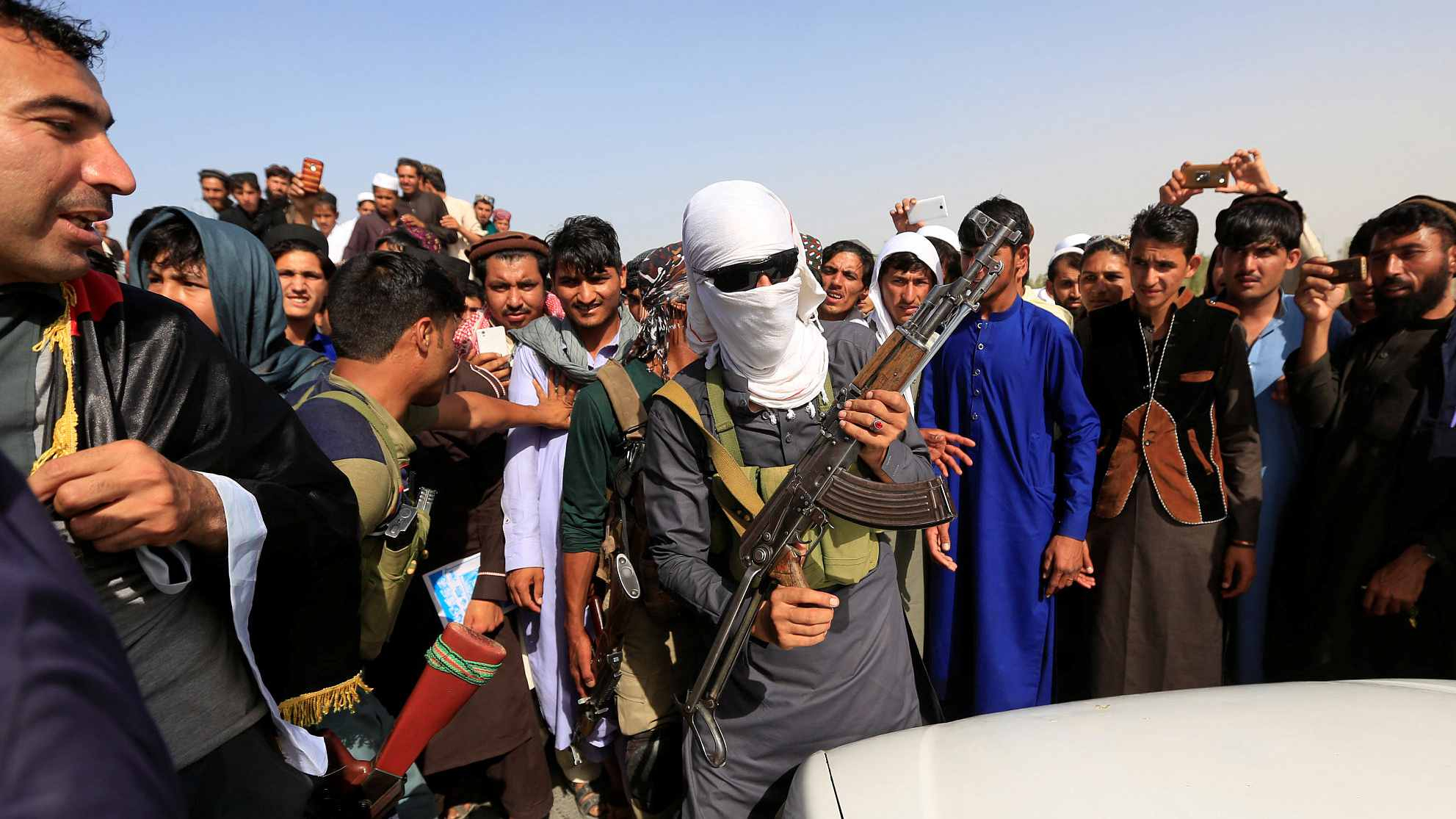
A Taliban member (C) celebrates ceasefire with people in Rodat district of Nangarhar province, Afghanistan, June 16, 2018. /VCG Photo
A Taliban member (C) celebrates ceasefire with people in Rodat district of Nangarhar province, Afghanistan, June 16, 2018. /VCG Photo
Editor's note: Freddie Reidy is a freelance writer based in London. He studied history and history of art at the University of Kent, Canterbury, specializing in Russian history and international politics. The article reflects the author's opinions, and not necessarily the views of CGTN.
While global attention is focused on the continued impact of the coronavirus outbreak in the Middle East, something dramatic is also happening. After decades of turmoil, Afghanistan could be on the brink of breaking the political deadlock that has held the nation back for so long.
Hope for peace could finally be policy this Saturday as U.S. and Taliban officials signed an agreement which will pave for U.S. troops to leave Afghanistan after 19 years.
Why might peace be possible now though and at what price does peace come for Afghans and the U.S.?
The meeting in Qatar between U.S. and Taliban officials will mark the beginning of the end of U.S. military presence in the region with a timetable for withdrawal to be agreed. The U.S. had invaded Afghanistan in the wake of the 9/11 terrorist attack led by Osama Bin Laden. At that time in 2001, the Taliban had been ruling the country with a brutal application of Shariah Law which had curbed the freedoms of women and led to many despotic measures in the name of religious conviction, even televisions were considered "haram."
The Taliban had come into power in Afghanistan replacing the warlords who ran most of the country in the wake of the Soviet Union's withdrawal in 1989. Back then, the Mujahideen guerrilla forces had been backed by the CIA as part of a long national history of foreign involvement in the country's affairs.
This weekend is an opportunity for Afghans to start to take a greater role in the running of their country. Until recently, the prospect of peace seemed remote. Former Afghan president Hamid Karzai had always opposed the accommodation with the Taliban. Presidents George W. Bush and Obama had also not countenanced such a move.
Karzai and his successor Ashraf Ghani come from the former Northern Alliance group of fighters who had banded together in opposition to the Taliban. They had fought each other, seen their friends and group members die around them and the society and fabric of the nation crumble. It therefore seemed an insurmountable block to any proposed dialogue.
Today though, Afghanistan has a new generation of men and women who grew up after the Soviet withdrawal, that have lived through years of fighting between factions and who are now desperate for a new approach and an opportunity to strive for something better.

U.S. Secretary of State Mike Pompeo is greeted by Afghan President Ashraf Ghani during an unannounced visit to Afghanistan, at the Presidential Palace in Kabul, Afghanistan, June 25, 2019. /VCG Photo
U.S. Secretary of State Mike Pompeo is greeted by Afghan President Ashraf Ghani during an unannounced visit to Afghanistan, at the Presidential Palace in Kabul, Afghanistan, June 25, 2019. /VCG Photo
In the build up to talks, both the U.S. and Taliban agreed to a seven-day ceasefire, which has been largely successful. Fleeting as it may be, the ceasefire has increased pressure on a successful conclusion to talks as the possibilities of peace are visible.
A great deal of uncertainty and trepidation exists though. Those in government are extremely concerned that a significant number of talks have been exclusively between the Taliban and the U.S. The government has always been able to call on U.S. firepower to retain order, but without that, it is almost certain that the Taliban will return to power.
Many also recall the brutality of the days of Taliban rule. As with the conclusion of any conflict, there is the specter of reprisals and reparations. Afghanistan has a fledgling legal system which is unlikely to be able to stand up to concerted pressure. This undermines the confidence the present government and those associated with it have that they will be treated fairly if the Taliban returns to power.
Assurances are being given though by the Taliban about other areas of concern. The group is claiming that women will be able to continue to be educated and work, although in areas presently under Taliban control, this isn't the case.
The United States too is having to reconcile the risk of what Afghanistan could become, with the wider desire to bring the 19-year campaign to a close. Afghanistan has been one of the longest campaigns in U.S. history, which, as with the British and Soviet Union before them, has cost an enormous amount of money, political capital and lives with little to show for it.
It is likely that the U.S. will agree to a phased withdrawal which will shift the responsibility for a smooth transition to the Taliban. It is important to remember that the Taliban are not the ruling party of Afghanistan.
The present government will also need to extend an olive branch and accept Taliban influence in order to give peace a chance. In this initial period, all three parties will be invested in a smooth and orderly transition. Once the U.S. military operation ends however, the real challenge begins. Peace in Afghanistan could finally be within grasp, but all sides will need to cede ground and agree a common greater good for the benefit of all Afghans.
(If you want to contribute and have specific expertise, please contact us at opinions@cgtn.com)